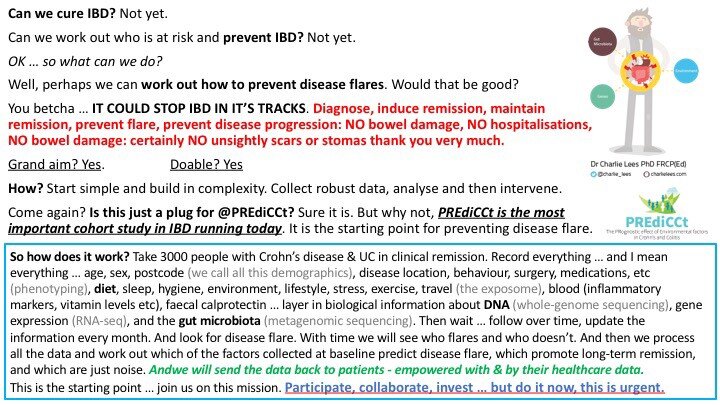Finding the cause of disease flares in Crohn’s disease and ulcerative colitis
Crohn’s disease: flares, grumbling inflammation and disease progression (bowel damage)
Crohn’s disease and ulcerative colitis are chronic, incurable inflammatory bowel diseases that typically affect young people. They are characterised by unpredictable and disabling periods of ‘flare’ that have a cumulative damaging effect on the bowel. The symptoms of a flare vary widely, but often include urgent, watery diarrhoea (frequently in excess of ten bowel motions per day, with blood … and overnight), cramping, abdominal pain and severe tiredness. Other symptoms may be incontinence, mouth ulcers, joint aches, nausea and vomiting, anorexia and weight loss. Even more dangerously, disease flares are often ‘silent’. This disconnect between underlying gut inflammation and symptoms can result in big trouble. We now know that we must treat to target to abolish both symptoms and inflammation by achieving mucosal healing.
We know precious little about disease flares in IBD. What causes them? How often do they happen? How can we as doctors prevent them? Who needs intensive maintenance therapy and who can go without? What is the best monitoring strategy that incorporates both symptoms and inflammation? How can patients help prevent them? Diet, environmental factors, lifestyle, drugs, the microbiome, genetics … all these factors require urgent investigation so we can make firm recommendations and then hopefully reduce flare rates. Or even eliminate them completely.
The central aim of the PREdiCCt study is to find out what causes disease flares in Crohn’s disease and ulcerative colitis. This, we believe, is the most important first step. From there we can proceed to interventional studies to test the factors that we find to be associated with disease flare or protective by promoting prolonged remission. To do this we need a robust study in a large number of patients followed up carefully over a reasonable period of time. So, we ask for your patience. This is important work, but we are well on our way and with your help we will make this succeed and benefit everyone with IBD.
We are recruiting just over 3000 people with Crohn’s disease and ulcerative colitis in clinical remission. We collect a large amount of data at baseline. These include detailed information about the disease — location, behaviour, drugs, surgical interventions etc. — micronutrients (including iron stores and vitamin D), lifestyle (stress, sleep, work, exercise, quality of life, travel), diet (a 180 point food frequency questionnaire and a 4 day weighed food diary), the gut microbiome (sequencing all the bug including bacteria, viruses and fungi), gut inflammation (calprotectin), genetics (whole-genome sequencing) and gene expression (RNA-Seq). These data are all inputted through a bespoke web portal. Most of this can be done by patients at home with the samples (one saliva and two stool samples) sent in by return of post. Monthly questionnaires are then sent automatically to patients via the portal.
When we have completed recruiting the cohort later this year we can start our first phase of analysis. We will have a very rich dataset because, in addition to describing the clinical and lifestyle features of the cohort, we will be able to make important comparisons of diet and the microbiome and underlying genetic variation. Once the latest patient has completed the 2 years of follow-up we will carefully analyse the clinical, lifestyle, environmental, dietary, microbial and genetic factors from the baseline dataset that predict flare and which are associated with long-term remission.
PREdiCCt is currently recruiting patients across the UK. We have very exciting plans to transfer the study onto a dedicated mobile platform later this year. This truly innovative approach will allow us to hand patients a live, real-time, curated set of their case-notes which we believe will transform healthcare interactions for patient and doctor / nurse. And then we aim to launch PREdiCCt in several additional countries across Europe, N America and potentially Asia. Imagine if we find the same environmental and microbial factors associated with flare in different cultures with divergent lifestyles. This would provide utterly compelling evidence for causative factors.
For more information on how to help with the study as a patient or an investor please get in touch!
www.predicct.co.uk (look out for new website coming soon)





